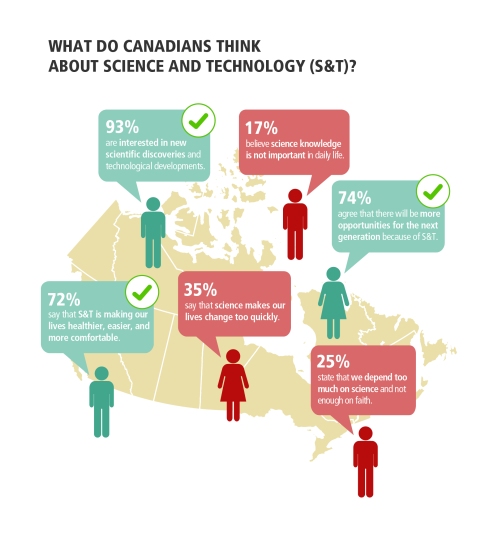I had the opportunity to represent my department at the Vancouver Telus World of Science during Telus World of Science Community Celebration Free Admission Weekend last year. 20,500 people showed up. Not just families, which we normally would expect with a visit to the Science World, but also teenagers, young adults, retirees, and more.
Having done science outreach and communications for the better part of my life, our general public’s enthusiasm toward science is hardly “just anecdotal” for me. As the person coordinating many public events for my department, time and time again I was worried that nobody will show up to a talk about the beginning of the universe, about the discovery of a new particle, about the physics behind climate change, about what “time” is, about the latest research on LED and Lasers…
And time and time again I was proven wrong.
So when David Kent, a friend from my Let’s Talk Science days, said the following in his recent article, “Sorry Rick Mercer, I’d love to agree but I think you’re wrong,” I had to disagree.
I believe Rick Mercer thinks that science is cool, and I even believe that he would be pleased to see his tax dollars (and maybe even his charitable dollars) go to support blue-sky research. But I do not believe Mr. Mercer’s idea that Canadians as a whole are interested although I, like him, would wish it to be the case. I think Mr. Mercer’s claims about Canadians’ passions are anecdotal at best, and lack any evidence – indeed it is possible that Canadians don’t give a hoot about science for science’s sake.
I’ve spent the better part of the last 15 years doing scientific research and outreach in Canada and the United Kingdom. To me it appears that, despite science influencing just about every aspect of their lives, the average Canadian adult does not particularly care about how or why something works. Canadians care about cures for their loved ones, faster mobile phone technologies, higher-resolution televisions, and fuel-efficient cars and homes.
In fact, the latest report “Science Culture, Where Canada Stands” by the Council of Canadian Academies seems to support what I have seen. The issue is not in our public’s interest in science. There is plenty of that here in Canada.
David went on to say,
I would love to be proven wrong and I hope that this article might inspire some more efforts to create a better public understanding of, and support for, basic scientific research.
The real issue here is, with Canada’s short history, the spread of our population across a massive landscape, the lack of a champion organization or political momentum, and our current government’s unflattering attitude, what we can do creatively to foster public support for basic research. And, we as scientists or science communicators should stop expecting public enthusiasm alone is sufficient. What David is asking for takes more than just that.
In fact, for UK, which is the country that David is stacking Canada against, the two champion organizations I am aware of both have very long histories. The British Science Association was established in 1831. The Royal Institute of Great Britain was founded 1799. (And remember Canada only came about in 1867). These champion organizations have been a big part in driving the dialogues about science and science education in UK. Together, the environment fostered by such organizations significantly contributed to UK’s scientific atmosphere now.
So, how are we going to catch up?
It takes years of building human capacity by science communication training – through science communication programs from the Banff Centre, Laurentian University, Mount Saint Vincent University, and several science journalism programs.
It take organizations such as Evidence for Democracy and Get Science Right to encourage people to start writing emails to their MPs, to bring attention to science-related policies, to be a political voice from this side of the bench.
It takes making science geographically more accessible to everyone in Canada. For example, you can now watch public lectures from the Perimeter Institute for Theoretical Physics live online, without taking a trip to Waterloo, Ontario – and if you want more, check out their archive.
It takes our scientists talking to others, not only about the science they do, but also about why the science is important to others – why, when someone is worried about the money for rent tomorrow, about looking for a job, about whether his or her child can get a childcare spot, this someone should care about basic science research. That is what many of the Science Borealis bloggers have been able to do through their blogs.
And, can we encourage more collaborations beyond science for simply science’s sake – how about being part of literature, art work, technology, movies, entertainment, and beyond? How about more events like the Beakerhead in Calgary, A smash up of art, science and engineering?
But in the end, it takes time to build up momentum. While the Banff Science Communications Program is about to celebrate its 10th anniversary, most of these other science communication activities only happened in the past 2-3 years. This further speaks to the need for building capacity, and when we have reached the tipping point, things happen. More and more people will finally go, “it is time to do something about this in Canada,” as most of groups mentioned here have done.
So, let’s stop thinking that our public are not interested in science. They are. But science does not exist in its own silo. The bigger question is, why should the public care about funding for basic science research, about science-related policies, about the freedom to access research done by our own government scientists. And that, takes more than Canadians’ enthusiasm toward science. That takes capacity, momentum, and the tipping point.
PS. Here is Rick Mercer’s Rant that David was referring to.





